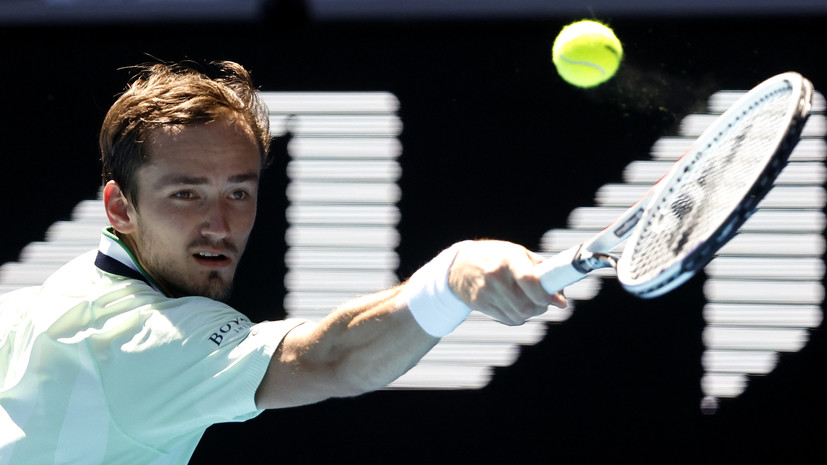Daniil Medvedev was the only Russian tennis player to reach the second week of the Australian Open this year.
The finalist of the last tournament did not experience any special problems on the way to the fourth round, giving one set only to the host of the competition, Nick Kyrgios.
Moreover, even after that match, he knew that until the quarterfinals he would not have to meet seeded rivals - all potential competitors with a high rating dropped out of the fight.
But in no case should Medvedev underestimate his opponent in the 1/8 finals.
The tournament grid brought him together with the American Maxim Cressy.
Although he is ranked 70th in the world rankings, and made his debut in adult tennis just a year and a half ago, this season he managed to loudly declare himself and become almost the most progressive player in January.
Suffice it to say that before meeting with the Russian, Cressy had already won 11 matches this year, and in six of them he beat rivals who surpassed him in rating. The Paris-born American's ascent began with a tournament in Melbourne, where he defeated compatriot Reilly Opelka (two match points), Spaniard Jaume Munara and Bulgarian Grigor Dimitrov. In the final, Cressy met with Rafael Nadal himself. During the match, the American had a setball and led with a break in the second game, but still lost to the Spaniard.
At the Australian Open, Cressy continued to amaze and in his first fight he beat John Isner, seeded under the 22nd number. It took all five sets to determine the winner in this confrontation. After that, Cressy reached the fourth round of the Grand Slam tournament for the first time in his career, guaranteeing himself a jump of another 11 places in the ATP rankings. Such a breakthrough for the tennis player was largely ensured by his style of play - a powerful second serve, an aggressive reception and frequent exits to the net.
In the meeting with Medvedev, Cressy did not invent anything and immediately resorted to his favorite tricks. However, they did not work so effectively against the Russian. Already in the third game, the American lost his serve, making two double faults. For every successful entry to the net, he had one unsuccessful one, and the game on the back line was almost always for Medvedev. Cressy never tried to turn the tide of the first set and lost with a score of 2:6. The statistics of unforced errors were very eloquent - only one for Medvedev and 14 for Cressy.
In the next installment, the American improved the quality of the game, which allowed him to keep the pitch.
It became much more difficult for Medvedev at the reception, and in the end he did not earn a single break point, although he did not give up trying to avoid a tie-break until the very end.
Cressy thought the same when it was time for the 12th game.
If before that Medvedev easily took his serve, giving a maximum of two points, then this time he made a couple of mistakes and gave his opponent a set point.
The Russian saved himself with a signature strike on the diagonal, and then waited for response errors from Cressy, which allowed him to still play a tie-break.
At that moment, the American suddenly lost all his strengths and was practically helpless both on the pitch and on the exits to the net.
Medvedev earned four set points and took the game on the third try with an ace.
The third set was similar in many ways to the second.
Again, none of the opponents managed to hit each other with a serve.
Although Medvedev again played almost flawlessly, with only one unforced error, he was less likely to take the initiative, while Cressy again found his pace.
The course of the game was also affected by the short medical breaks that both tennis players took to stretch their backs.
The party differed only in its outcome.
At the tie-break, there were no signs of trouble for Medvedev.
He took his draws and even led on someone else's pitch, cunningly taking them to his feet.
But Cressy immediately won two points, and received two more from the Russian.
That was enough to win a set against the second racket of the world.
The next game again turned into a painful pursuit of a break for the opponents, only now Medvedev finally began to succeed in it.
Almost every game on Cressy's pitch stretched out for several minutes, and the Russian was close to the turning point for the entire match several times.
But it was not possible to take advantage of the opponent's mistakes for a long time.
Medvedev was so pissed off that he complained in front of the camera about the opponent's boring game.
The American resisted fiercely until he was broken in the 12th game.
Adding two more double faults to his statistics and bringing their number per match to 18, Cressy allowed Medvedev to show all his skills and take the lead for the first time since the first set.
Last year's finalist had only to apply for the match, and with just a few blows he brought the meeting to an end.
Medvedev won with serve dominance and a colossal margin of unforced errors, 11 to Cressy's 49.
But at the same time, the Russian will have his longest match at the current Australian Open (3.5 hours).
Medvedev reached the quarterfinals of the major for the sixth time in his career, and his next opponent will be the Canadian Felix Auger-Aliassime, whom the Russian recently beat at the ATP Cup.

